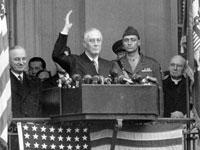BOB GARFIELD: Forty-two times in the past the torch has been passed from one president to another, but seldom in American history with the anticipation and expectation that awaits Barack Obama. And his first test will be instantaneous – his inaugural speech to the nation, when he’s expected to articulate his vision, frame his program, inspire the masses, quell his critics and, for good measure, make his mark on rhetorical history. Obama says he’s turned for his inspiration to Abraham Lincoln's two inaugurals, deemed the gold standard of the genre, but Harvard historian Jill Lepore thinks he should be aware of the lead standard as well.
JILL LEPORE: You know, the worst really is Warren G. Harding. You have to read H.L. Mencken’s essay about Warren G. Harding’s Inaugural Address. Mencken hated Harding, and [LAUGHS], you know, he wrote this essay that just slammed Harding’s inaugural piece by piece, just took it apart. You know, “It is flap and doodle,” Mencken wrote. “It is balder and dash. It is the yelping of endless dogs in the night,[BOB LAUGHS] a string of droopy clothes hanging from a line.
BOB GARFIELD: He concluded that the Harding speech was, quote, “so bad that a sort of grandeur creeps into it.”
JILL LEPORE: You know, one of the things that Mencken hated about Harding was his lack of specificity and then his simultaneous appearance of specificity. Harding had this kind of bureaucratese in which he spoke. So the passage that I think communicates this best is one of these lists. “I speak for administrative efficiency, for lightened tax burdens, for sound commercial practices, for adequate credit facilities, for sympathetic concern for all agricultural problems.” You know, are you roused to new sacrifices [BOB LAUGHS] for the nation?
BOB GARFIELD: I grant you this – “We have nothing to fear but fear itself” it isn't. Since we are in “We have nothing to fear but fear itself” sort of times, can we expect Obama to strike FDR-ish themes?
JILL LEPORE: I bet his speechwriters are paying a lot of attention to FDR’s first inaugural, which is a great example of how a speech that’s very well-crafted and full of rhetorical flourishes isn't necessarily a deceptive or a pandering speech and certainly isn't blather. You know, my favorite piece from that speech is when FDR just simply says, “The rulers of the exchange of mankind’s goods have failed.” There’s no buck stops here or whatever kind of mishugas about who did what. It’s just people were suffering and it was important to understand that this was a systematic problem and that the only thing that could possibly move forward the American people was frankness and vigor about the nature of the problem itself.
BOB GARFIELD: Finally, I want to ask you about expectations. With Barack Obama, he is so famously an orator that if he doesn't actually levitate the crowd I think we're going to be disappointed. Does that offer a special challenge for the President-Elect?
JILL LEPORE: Sure it does. I can't imagine having to be [LAUGHS] part of that speechwriting team. You know what would be a much better position would be to have been James Garfield, because I don't think [LAUGHS] anyone was expecting very much of him. He didn't even want to write the address. He actually kind of told his staff, look, I don't have to. I could just skip this because, really, no one can be as could as Lincoln. Why should I even bother? Why am I even going to try? But Garfield’s speech, I think it goes pretty far towards reaching what Lincoln was trying to do in 1865. In 1881, Garfield said to the American people, “My countrymen, we do not now differ in our judgment concerning the controversies of past generations, and 50 years hence our children will not be divided in their opinions concerning our controversies. They will surely bless their fathers and their fathers’ God that the Union was preserved, that slavery was overthrown and that both races were made equal before the law. We may hasten or we may retard but we cannot prevent the final reconciliation.”
BOB GARFIELD: And with that, we await the inauguration of the first African-American President. Do you expect any kind of racial themes to infuse President Obama’s speech?
JILL LEPORE: I think every inaugural address is a history lesson and you can't look at American history and not talk about race. I think Obama will talk about it less than he might.
BOB GARFIELD: Okay, well, we'll see very soon. Jill, thank you so very much for joining us.
JILL LEPORE: Thanks a lot.
BOB GARFIELD: Jill Lepore is author of The Speech in the January 12th issue of The New Yorker. She’s also a professor of history at Harvard University.

